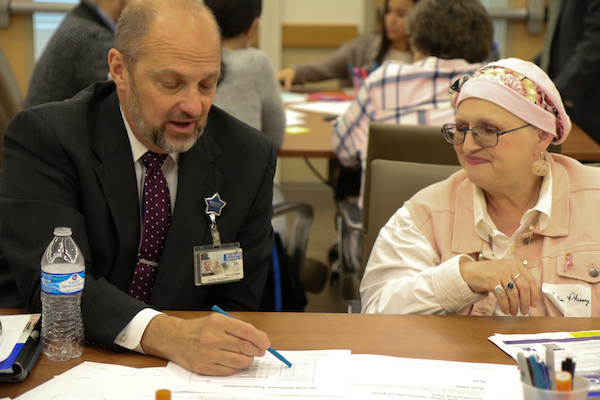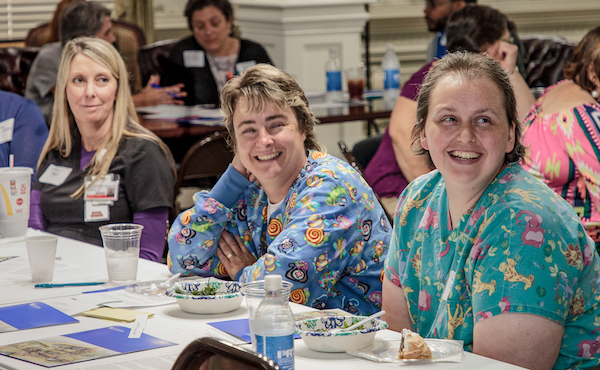
LAUNCH: A New Community Innovation Platform Will Empower Rural Cancer Patients
A public-private partnership with UC San Diego’s Design Lab will help rural cancer patients design digital health care solutions
By:
- Katie E. Ismael
Published Date
By:
- Katie E. Ismael
Share This:
Article Content
A new web platform released by LAUNCH (Linking & Amplifying User-Centered Networks through Connected Health), a public-private collaboration of which the University of California San Diego Design Lab is a founding member, will enable community-led connected cancer innovation. The platform, “LAUNCHPAD,” may be found at launchhealth.org.
LAUNCH begins with communities that face the dual challenge of high cancer mortality rates and low levels of broadband access and/or adoption. Its initial focus is to improve symptom management among cancer patients in rural areas by facilitating community-driven design, promoting rural broadband, and piloting connected health solutions. A demonstration project will begin soon in Appalachia Kentucky.

Participants at a LAUNCH-hosted innovation studio at Markey Cancer Center in Lexington, Kentucky, collaborate on an app to help rural cancer patients report their symptoms to a provider.
Contextual research conducted on the ground in Kentucky found that many historical approaches to connected healthcare innovation may be ineffective in underserved communities; there may be resistance to innovation projects led by outsiders, as these may threaten local values and the self-determination of communities. Instead, the research suggested that innovation initiatives seek ways to empower communities to help solve problems locally.
LAUNCHPAD is a “blueprint” and platform that helps communities co-design better cancer symptom management tools and practices enabled by connectivity. People can use the platform to describe their own healthcare challenges, pitch solutions to those challenges and contribute to building or testing solution prototypes. Community engagement and innovation is a critical part of the broader LAUNCHPAD blueprint that other cancer centers and rural areas can use to reproduce LAUNCH for their patients.
Don Norman, the director of the Design Lab, commented on the LAUNCH project’s distinctive approach, saying, “This contextual research demonstrates the complexity of community-based design. It shows how faith, independence, and family are critical to understanding healthcare. Many standard methods of applying community-based workers completely ignore these issues.”
In addition to the contextual research, LAUNCH is hosting Innovation Studios to involve stakeholders across sectors in the innovation process. The first Innovation Studio was held in June 2019 in McKee in rural Kentucky. At this studio, local residents, including cancer survivors, their caregivers, and local healthcare providers brainstormed ways to help cancer patients in places like McKee. Additional Innovation Studios were held at Markey Cancer Center in Lexington, Kentucky in October 2019. These were attended by clinicians, including doctors, nurses, and social workers, as well as current patients, survivors, caregivers, broadband providers, technologists, and others.
The Innovation Studios resulted in two new prototypes for codesigned cancer symptom monitoring tools. One called “You and Your Wellbeing” is a paper-based distress monitoring questionnaire that improves upon the NCCN Distress Thermometer currently in use in many NCI-designated cancer centers. The second tool, “MyPath,” combines a digital app with a redesigned service delivery system. The next phases of LAUNCH will involve testing and validating these new tools with patients, caregivers, and clinicians.
Dr. Eliah Aronoff-Spencer, a professor in the UC San Diego School of Medicine and one of the lead investigators on the LAUNCH project, refers to the LAUNCH approach as “flipping innovation.”
“We need to rethink, flip innovation and resource allocation from walled gardens in resource-rich settings to open ecosystems in the places where most people and their problems live,” he said. “Giving more power to individuals and communities to invent and build solutions at the last mile benefits everyone.”

Participants at a LAUNCH-hosted innovation studio in McKee, Kentucky, collaborate on an idea to help local cancer patients.
LAUNCH also hosted a Senior Leadership Think Tank at FCC headquarters in Washington, D.C. in May 2019. The meeting was convened to gather information and individual expert input related to the initiative’s efforts to date. Thought leaders were invited from government, academia, industry, healthcare systems, public health, biotechnology, design and innovation and telecommunications.
Opening remarks delivered by FCC Chairman Ajit Pai stressed the alignment of current FCC work with the LAUNCH initiative. He stated, “I strongly believe that connecting communities and health systems through deployment of high-speed broadband is essential to improving our nation’s health. And, I’m convinced that cancer represents a particularly compelling use case for the power of connectivity to reduce the burden of disease in our rural communities.” A summary report of the Think Tank event is available here.
LAUNCH is a collaboration among the Federal Communications Commission’s Connect2HealthFCC Task Force (C2HFCC); the National Cancer Institute (NCI); Amgen; the University of Kentucky Markey Cancer Center; and the UC San Diego Design Lab. Members of the UC San Diego team include Aronoff-Spencer; Melanie McComsey, research fellow for C2HFCC and design program lead at the UC San Diego Design Lab; Alexandra Hubenko, program manager at the Qualcomm Institute, the UC San Diego Division of the California Institute for Telecommunications and Information Technology (Calit2); and Don Norman, the Design Lab’s director. Aronoff-Spencer and McComsey are members of the Design Lab and are affiliated with the Qualcomm Institute, where the Design Lab is located.
Share This:
You May Also Like
Stay in the Know
Keep up with all the latest from UC San Diego. Subscribe to the newsletter today.


